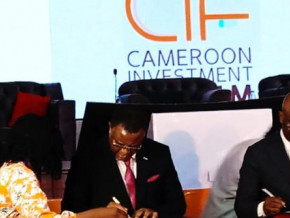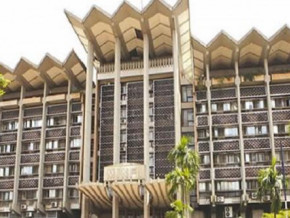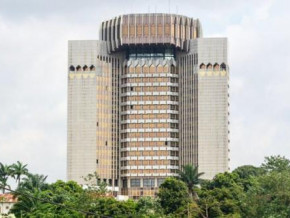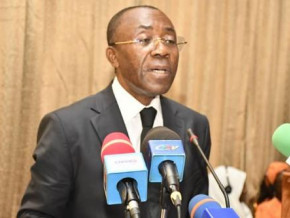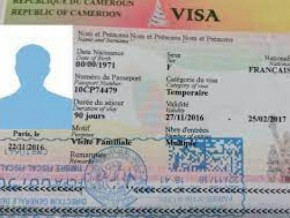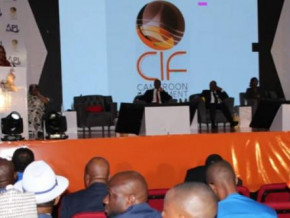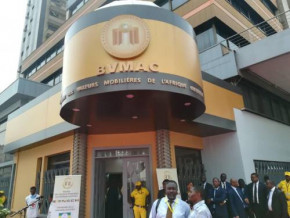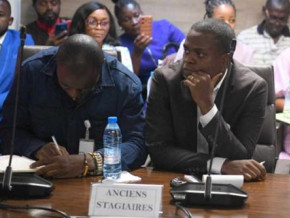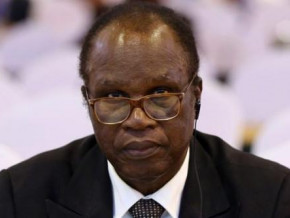
Players, strategies and weapons … : A Cameroonian’s view of economic war
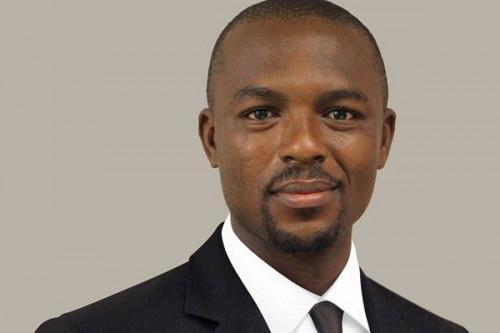
(Business in Cameroon) - La guerre économique (French for Economic war); this is the intriguing title of a book published by Afrédit in Yaoundé, Cameroon, in May 2019. Its author is Maurice Simo Djom, a geo-economics researcher. In the book, he "authoritatively" explains what an economic war is, a much-debated topic.
To illustrate his topic, the author relied on a fact he observed during his position as head of the institutional communication and strategic monitoring department at Afriland First Group, the group that heads Afriland First Bank. He was the head of that department since 2014 and is the proud student of Cameroonian billionaire Paul K. Fokam, president of Afriland First Bank, who prefaced his book.
Players, strategies and weapons in economic warfare…. In this interview, Maurice Simo Djom, who started his professional career as a journalist, explains the main findings of his research work.
Business In Cameroon : In your book, you took an opposite view to most researchers stating that economic war is a singular reality. How did you come to such a conclusion?
Maurice Simo Djom : By reading and observing. First, I read books on the topic and noticed that authors usually link economic war to conventional war. Some of them even use military strategy assessment grids to study economic warfare. On another note, I carefully studied interactions in the framework of globalization. I found out that economic warship is a unique reality that needs to be studied without blinders.
BIC : Looking at your approach, some people accuse you of being a methodological anarchist. What is your answer to that ?
MSD : I am not. I adopted an approach which is induction. I observed the fact, analysed the data and interpreted it. This is an extremely meticulous process. It patiently and laboriously provided a representation of economic war. Fact is, the people condemning my approach are fans of the inference approach. They want me to do it their way, that is to adopt a definition of economic war then use this definition as a rule in the remainder of my book. Truth is, inference is not adequate with my topic, I wanted to prove that those authors were wrong. For that purpose, I needed to find a convincing process, therefore, the use of data and facts since in the end, facts speak louder than theories.
BIC : It just so happens that some of your critics point out your aversion for theories…
MSD : This is because I prompted controversy about theory and theoreticians who use complex and abstract concepts to overshadow reality. This does not mean that I am fundamentally against theories. I estimate that every intellectual research project must create its own approach. It is only because of laziness that the same approach is used for every project. I am more inclined towards epistemological creativity.
BIC : Indeed, every part of your book has a touch of nonconformisms. For instance, the title is written vertically with three shadowy bands. Was that necessary to approach this topic on which scientists are not unanimous?
MSD : Yes, my position is extraordinary and states that economic war is a subtle paradigm. Authors who wrote about it before made a connection between this topic and violence. To express the contrary position of my argument, I wrote the title upside down to make even the form and the substance appear non-comformist.
BIC : You state that economic war is neither trade competition nor the economic dimension of conventional war. What is it then ?
MSD : When General Motors is opposed to Ford in the American market, it is trade competition. When that same General Motors is opposed to Toyota, we are moving from the domestic level to international relations and therefore, this is economic war. Indeed, America can validly use its public authority to twist the competition in Motors’ favor. This is the difference between trade competition and economic war.
As for the question concerning economic war being the same as the economic dimension of conventional war, my answer is no. Every war does have an economic dimension but, they are not waged with the same weapons. If the attacks are carried out on military fields, we are talking of conventional war. However, when the hostilities are conducted in a non-military environment, it is economic war. The qualifying adjective "economic" is not about the economic sector only but everything that is non-military.
Economic war is the subtle effort aimed at dissimulating non-military violence in cyberspace, international taxation, basic resource, economic liberalism, investment, and money.
BIC : Has it occurred to you that competition and conventional war could be different forms of economic war requiring precise players of international relations, specific weapons or tactics?
MSD : Conventional war is changing. Progress in the nuclear power sector reduced the probabilities for intense wars between national armies. Because of the principle of inalienability of violence, state and non-state actors are now concentrating on the multiplication of low-intensity conflicts and combats. This is one of the forms of violence that occurs during globalisation.
The other form is economic war. So, instead of waging wars using Kalashnikovs, states use multinationals, the 5G, tariff barriers among others for non-military fights. I also indicated that this violence takes two forms. Researchers must be careful to study the two forms without confusion.
BIC : Your theory is that economic war is waged with subtility, concealment and ruse. In that regard, it is opposed to the theory of Christian Harbulot, French strategist and founder of France’s economic warfare school, for whom "economic war is the states’ use of violence in the economic scene”. Is your view of "economic war" not contradicted by the United States of America’s openly stated will, under Donald Tump, to favor its firms?
MSD : The obvious belief is that Donald Trump’s open claims of economic war actions contradict my theory of economic war but, this is not the case. The logic remains the same: winners hide their violence in this war while losers complain. It happens to be that the USA is the loser in that economic and technology war against China. This is the reason Donald Trump is publicly showing his aversion towards China. No country can win all the time and everywhere.
Let’s also consider the Alstom case. Here, the USA is not complaining but France is. Why? Because France lost its flagship in the energy sector. Hereby, my view on economic war: subtle efforts to hide violence in the non-military area.
One last example is France against the fifteen countries of the CFA Franc Zone. According to Paris, this is monetary cooperation but what do Africans think it is? They think it is monetary slavery. These are the subtle indications of economic war.
While the loser complains about wealth and influence losses, the winner will claim it is all about cooperation, aid, monetary or trade policy. This specification about the dissimulation of violence is important for me. It is not stated in Christian Harbulot’s definition of economic war. Once you forget to preach dissimulation, you become the black sheep of the world economy. The standard wants everyone to preach liberalism and act according to its own interests and influence.
BIC : In the international scene, there is an increasing number of non-state actors like NGOs, terrorist organizations and multinationals that are as powerful as governments and able to tilt the balance in trade competition. In your book, you even described how non-government actors affect governments’ taxation powers. Yet, you write that "public authorities must step in regarding trade competition to tilt the scales in a way, before we talk of economic war." Is your statism not in contradiction with the current state of international relations?
MSD : You are right to mention the increasing power of non-state actors. Some of them are a threat to governments but, there is no contradiction in the statism and such reality. On the contrary, they are complementary. First of all, these actors are usually an emanation of public authorities. Secondly, despite their influence, public authorities keep the actors in operation because they use them.
Third point is this: the sanctions pronounced by governments are to show who is the boss. Look at Facebook after Cambridge Analytica for instance. The multinational was slammed a $5 billion fine! Mark Zuckerberg was obliged to wear a suit (a thing that he rarely does) to stand before the commission for inquiry. Take also Lehman Brothers, the fourth largest investment bank in the USA in 2006. A single signature of the secretary of treasury could have bailed it out but no. Henri Paulson let it go bankrupt. Who now remembers the CEO PDG Dick Fuld ?
The dimension "competition-cooperation" illustrates the complex relationship between public authorities and multinationals. Governments use these tools to show their influence on the international scene. At the same time, those actors are building alternative influence means but, in the end, it is always the finance minister, the president or director of a said public regulator that has the final say.
BIC : You present Africa as a victim of economic war and just a battleground. Who are the ones waging that economic war on the continent ? Why and what are their weapons ?
MSD : Foreign powers use various tools to wage war among themselves in Africa. These tools are multinationals, partnership agreements, investment funds, lateral and bilateral aids. WAR BY OTHER MEANS, a book by two American writers (Robert Blackwill and Jennifer Harris) identified seven economic war weapons. I insisted on the fact that Africa’s enemies usually make sure that the continent is unable to defend itself. They elaborate standards and conditions that leave Africa powerless.
BIC : So, you mean the CFA Franc (for France) and the economic partnership agreement (for the European Union) were just created to enslave African countries like Cameroon that adhered to them? What about the battle between economic powers to ensure a privileged access to the continent’s markets and commodities?
MSD : Foreign powers have their own views of Africa. For some, it is an influential area that should be controlled. For others, it is a competitor that should be in hibernation. For some others, it is a market where they can sell their products. Anyway, the continent’s multifaceted potential is cause for concern. Nobody wants to stay away from that vast market which has tremendous resources and an envious youth.
BIC : Have those tools you mentioned had no positive impact on African countries ?
MSD : They do have something positve because they reveal our weaknesses. They can lead us to understand that we are at war, we need to wake up and work because nothing is acquired without work. We need to fight with the weapons of economic war to emerge in this era of globalization. The world is not made by sleepers and the weak.
BIC : On the continent, there are many people who do not see things as you see. Will you say that this is because Africans are unaware of the economic war?
MSD : Africa has a romanticized view of international relations. Executives who lack strategic culture and act on their guts must learn economic warfare to know how things are done. Economic warfare is a concept that informs us that globalization has exited the era of ideological rigidity and entered a new era. Governments that do not understand the rules will be simply consumed.
BIC : So, this is the reason you wrote your book…
MSD : Exactly. This book is an instruction for globalization purposes. I wrote it for those who want to understand globalization; not just appearances and sayings. Africa is a victim of mutually agreed upon discourses on international relations. Our responsibility is to project a realistic view of African relations with the rest of the world. The continent must give itself the right to speak out and assert itself.
BIC : What can be done to provide Africa in general and Cameroon in particular with a geo-economic conscience?
MSD : We must ask those governing us to open their eyes to this reality. Looking at their actions, we think that most African gvernments are lulled into an illusion of liberalism and peaceful trade. We also need a methodical pedagogy for young generations hoping that once they are in charge, they can make the difference. We should create an African think tank worthy of what is at stake to carefully observe the economic war unfolding.
Interview by Aboudi Ottou
Mags frontpage
- Most read 7 days
- shared 1 month
- read 1 month



